Eyes Burning? How to Stop It (& the Causes)
Home / Eye Health and Preventive Care /
Last Updated:
Medical Treatment Is Needed if the Sensation of Burning Eyes Does Not Go Away
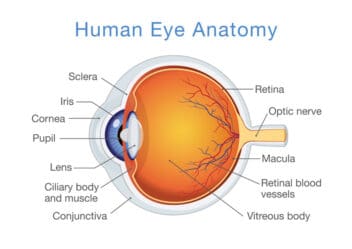
While there are at-home treatments, like compresses and eye drops, that can alleviate symptoms, it is important to get appropriate diagnoses and medical treatment from professionals if the burning sensation does not go away within a few hours. You may have an underlying condition, from allergies to arthritis, which contributes to feeling like your eyes are burning or irritated. By itself, burning eyes is not a medical condition requiring serious treatment, but it can indicate several different conditions.
The feeling of your eyes burning typically indicates a minor irritant that will go away as soon as your tears wash your eye out. Sometimes, the sensation of burning or stinging eyes indicates a more severe problem, like a chemical burn or sunburn on the eye, or chronic dry eyes that require more intensive treatment than over-the-counter eyedrops.
You may have an eye infection called conjunctivitis, an infection surrounding the eye, or a chronic condition that causes changes to the eye. You may also have an underlying chronic illness.
The only way to treat burning eyes that do not go away in a few hours is to visit a doctor.
Table of Contents
The feeling of your eyes burning typically indicates a minor irritant that will go away as soon as your tears wash your eye out. Sometimes, the sensation of burning or stinging eyes indicates a more severe problem, like a chemical burn or sunburn on the eye, or chronic dry eyes that require more intensive treatment than over-the-counter eyedrops.
You may have an eye infection called conjunctivitis, an infection surrounding the eye, or a chronic condition that causes changes to the eye. You may also have an underlying chronic illness.
The only way to treat burning eyes that do not go away in a few hours is to visit a doctor.
What Causes Your Eyes to Burn?
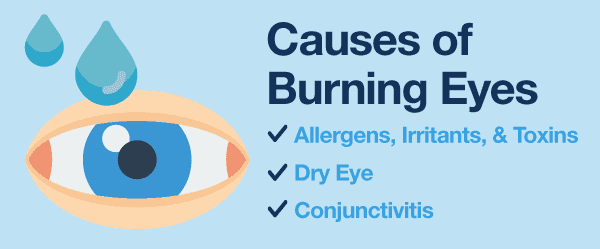
However, if the sensation of burning in your eyes does not go away or gets worse, there could be several causes. Irritants including allergens may trigger a burning eye sensation; severe eye problems may lead to burning eyes as one of the first symptoms; or an infection in or around the eye could cause burning, watering, or other related sensations. Some of these can be treated at home, while others require ongoing, regular treatment an optometrist or ophthalmologist. Some are considered medical emergencies and require emergency treatment.
Allergens, Irritants, and Toxins
Many people who struggle with allergies to pollen, dust, or pets experience dry, burning, stinging, or watering eyes as a symptom. Perhaps the wind blew a piece of dust or grit into your eye, leading to irritation and a burning sensation that lasts a little while after the irritant has been removed. If you wear makeup, particles from your mascara, eyeliner, or eye shadow may get in your eye. Typically, these irritants can be blinked away or washed out with over-the-counter eye drops.
You deserve clear vision. We can help.
With 135+ locations and over 2.5 million procedures performed, our board-certified eye surgeons deliver results you can trust.
Your journey to better vision starts here.
Other kinds of irritants can cause more serious problems, including chemical burns. A mild version of this occurs when you get sunscreen in your eyes. The product contains chemicals that lead to a superficial chemical burn that lasts a couple of days, then eventually goes away.
Industrial toxins, household cleaners, paint, gasoline, and other substances are very dangerous, volatile, and toxic. Being around them may sting your eyes with a mild chemical burn, and accidentally getting them in your eyes may require emergency medical attention.
Larger irritants like sand can lead to corneal abrasions, or scrapes on the cornea. Many of these are minor and heal quickly, but sometimes, they cause inflammation of the eye, called iritis. Infection in the cornea can become a corneal ulcer, which may lead to blindness if left untreated.

Another serious problem that can lead to burning eyes and requires medical treatment is allergic conjunctivitis, or inflammation of the eye tissue caused by allergies. Like other kinds of allergic reactions, the immune system reacts to the presence of an allergen by producing antibodies. These may cause the eyes to water, itch, hurt, become inflamed, or swollen.
A doctor can diagnose and treat any allergies you have, which are systemic and not just an eye condition. Taking antihistamines, either over-the-counter or prescription medications, can manage allergies. If you take an allergen test and know what triggers your allergic reactions, avoiding specific allergens can also help.
The sun can be a serious irritant to the eyes, and too much UV exposure can cause a sunburn on the eye, like it does on the skin. This is called ultraviolet keratitis or photokeratitis, and it is a painful condition in which exposure to UV light and too much sun burns the cornea, which is made up of epithelial cells loosely similar to skin.
Snow blindness is a type of photokeratitis that occurs during skiing, snowshoeing, or another outdoor activity in which the sun bounces off bright white snow and into your eye. Burning or itching eyes is one symptom of this kind of burn.
Dry Eye
Some people develop chronic dry eye, which means they do not produce enough tears in their tear ducts, or they have poor quality tears. Tears are made up of three layers — oil, water, and mucous —and if there is not enough of one or more of these components evenly spread over the eye, the eyes become dry and irritated. This can lead to a burning sensation.
There are many causes of chronic dry eye.
- Infection
- Age
- Medicines like antihistamines
- Environmental conditions like smoke or high wind
- Wearing contact lenses too long
- Medical conditions like arthritis or diabetes
- Refractive eye surgeries like LASIK
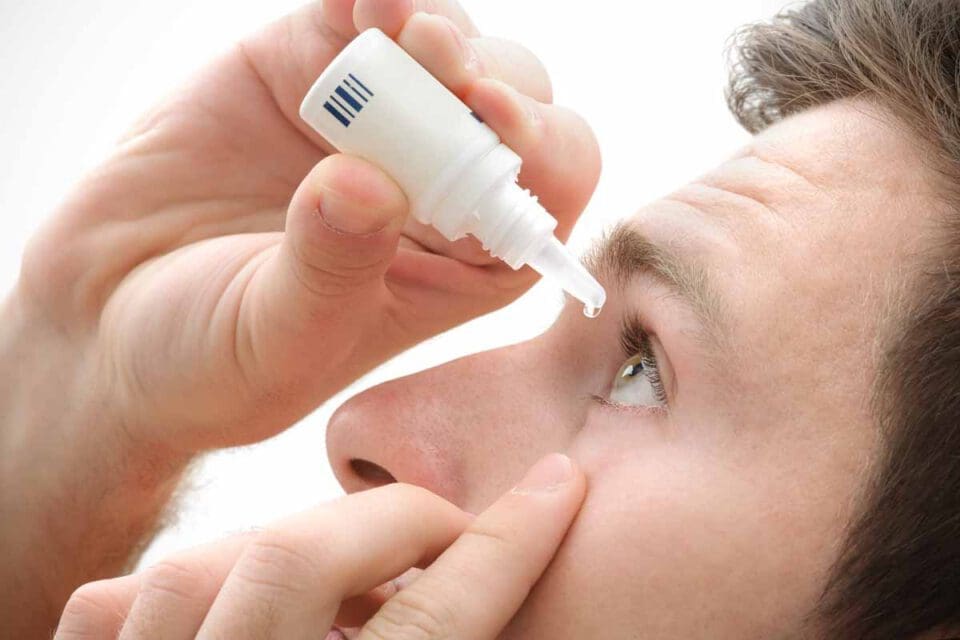
Chronic dry eyes can be treated to reduce or prevent the burning sensation. Treatments include:
- Adding tears with eye drops.
- Conserving tears by blocking the places where tear ducts drain temporarily with gel plugs or permanently with surgery.
- Increasing tear production with prescription eye drops.
- Treating for inflammation in the ocular surface or eyelid.
Lifestyle changes you can make to reduce or prevent dry eye include:
- Blink often enough and blink more if your eyes feel dry or irritated.
- Drink plenty of water.
- Wear sunglasses outside.
- Increase the humidity in your home or office environment.
- Take nutritional supplements to improve the quality of your tears.
Burning in your eyes can lead to several different diagnoses, so it is important to get help from an optometrist or ophthalmologist if you suffer a burning sensation in your eyes that does not go away or gets worse over time.
You deserve clear vision. We can help.
With 135+ locations and over 2.5 million procedures performed, our board-certified eye surgeons deliver results you can trust.
Your journey to better vision starts here.
Conjunctivitis
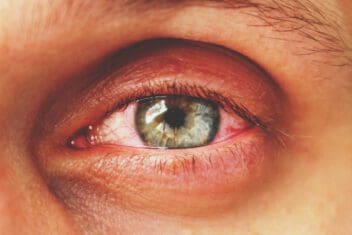
More commonly called pink eye, conjunctivitis is an inflammation or infection in the transparent membrane, or conjunctiva, which lines the eyes and covers the white area of the eyeball. Small blood vessels become inflamed, making them more visible, so one symptom of conjunctivitis is red, irritated-looking eyes. This disease is caused by bacteria or viruses, but the inflammation is also associated with allergies or, in newborn babies, an incompletely opened tear duct.
Conjunctivitis is very contagious, so it is important to see your general practitioner if you notice dry, itchy, burning, or red eyes; discharge coming from one or both eyes; and increased watering of your eyes, which does not go away in a few hours or a day. You may need antibiotics or other treatments to alleviate symptoms and reduce the risk of spreading the disease.
Other Eye Conditions
There are several other serious eye conditions, which a burning sensation in your eyes may indicate you have.
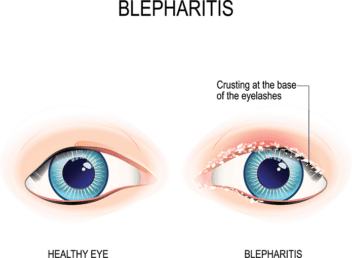
- Blepharitis: An infection or inflammation of the eyelids caused by bacteria, mites, or irritants. The eyelids will swell, and the areas around the eyelashes will appear infected or swollen. Your eyes may feel itchy, dry, or like they’re burning or stinging, and you may have some discharge, including oily flakes, at the base of the eyelashes.
Treatment for this eye disease includes warm compresses to reduce inflammation and remove flakes, eyelid scrubs at the base of the eyelashes, antibiotics, special eyedrops to reduce burning or redness, and improved understanding of skin and eyelid hygiene. - Pinguecula or pterygium: Also called surfer’s eye, these are growths on the conjunctiva. A pinguecula looks like a yellow bump or spot on the eye, usually on the side near the nose. A pterygium usually starts as a pinguecula, but spreads across the eye, sometimes far enough to cover part of the cornea.
This is a preventable condition caused by too much exposure to UV radiation, so wear UV-resistant sunglasses and goggles when enjoying time on the beach. Typically, the condition does not require treatment because it does not impact vision, but if symptoms like burning eyes become too uncomfortable, you may receive lubricating steroid eyedrops. - Ocular rosacea: This is inflammation causing redness, itching, and burning of the eyes. Rosacea is a chronic skin disease that affects the face. In some instances, developing ocular rosacea indicates that you will develop the skin variety later. Heredity, environmental factors, eyelash mites, blocked eyelid glands, and bacteria all contribute to this condition. When you have chronic dry eye associated with ocular rosacea, your cornea can be affected, which can make eyesight worse.
There are also serious, chronic health conditions that may cause dryness or burning in the eyes as one of the symptoms.
- Rheumatoid arthritis
- Scleroderma
- Sarcoidosis
You deserve clear vision. We can help.
With 135+ locations and over 2.5 million procedures performed, our board-certified eye surgeons deliver results you can trust.
Your journey to better vision starts here.
References
- What Causes Burning Eyes? (May 8, 2018). Medical News Today.
- Five Reasons Your Eyes are Burning Like Mad. (May 23, 2018). Self.
- Feeling the Burn of Sunscreen in Your Eyes? Essilor News.
- What Causes Corneal Abrasions? (May 11, 2016). Healthline.
- Eye Allergy Overview. American Academy of Allergy, Asthma, & Immunology (AAAAI).
- Ultraviolet Keratitis. (April 6, 2017). Medscape.
- Dry Eye. American Optometric Association (AOA).
- Pink Eye (Conjunctivitis). (December 15, 2018). Mayo Clinic.
- What is Blepharitis? (November 14, 2018). American Academy of Ophthalmology (AAO).
- Blepharitis Treatment. (November 14, 2018). American Academy of Ophthalmology (AAO).
- What Is a Pinguecula and a Pterygium (Surfer’s Eye)? (September 1, 2017). American Academy of Ophthalmology (AAO).
- Pinguecula and Pterygium (Surfer’s Eye) Treatment. (September 1, 2017). American Academy of Ophthalmology (AAO).
- Ocular Rosacea: Overview. (June 23, 2018). Mayo Clinic.
This content is for informational purposes only. It may have been reviewed by a licensed physician, but is not intended to serve as a substitute for professional medical advice. Always consult your healthcare provider with any health concerns. For more, read our Privacy Policy and Editorial Policy.
